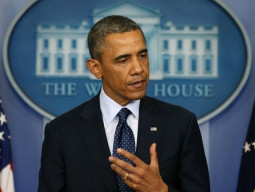
ISLAMABAD: When bureaucrats do not like a policy, they do not oppose it. They simply strangle it in red tape. Such appears to be the fate of the newly constituted National Commission for Human Rights, formed at the urging of the European Union, which is prevented from functioning by hostile civil servants in the federal law ministry.
The NCHR was created after the government of Pakistan gave assurances to the EU that it would improve the government’s human rights record, in exchange for preferential access to European markets for Pakistani exporters through a status known as GSP Plus. Yet, despite strong pressure from Brussels, the bureaucratic machinery in Islamabad, particularly the law ministry, do not appear to have bought into the need for a national human rights commission, and appears to be going out of their way to create hurdles for the NCHR.
For instance, after a story was published in The Express Tribune on August 23, highlighting the difficulties faced by the new commission in staffing, funding and even office space, the law ministry decided to blame the whole affair on the NCHR itself. Deputy Secretary Irfan Shabbir wrote to the NCHR Chairman Ali Nawaz Chowhan acknowledging the news story, but claiming that the reason his salary, and those of other commission members, have not been paid is because the NCHR themselves have not engaged in a consultation process with the law ministry on the matter.
“The delay is on the part of commission and not on the part of the ministry,” wrote Shabbir. “The ministry of law, justice and human rights is there to facilitate but is not obliged to administer.”
The letter ignored the fact that the NCHR has only one room in a federal building in Islamabad from which to operate, and other funding hurdles being created by the ministry.
For instance, while the government has allocated Rs5 million for the operational (non-salary) expenses of the NCHR, the money has to be authorised by a drawing and disbursement officer (DDO) at the law ministry, and the ministry has yet to designate a DDO for the NCHR.
The lack of funds has meant that the commission has not been able to recruit any staff, and the lack of space has meant that even if it were to somehow find the staff, it would have nowhere to put them. The room meant for the chairman’s office currently houses the entire commission.
The law ministry was supposed to have sent at least 20 to 25 civil service officers to the commission when it was formed four months ago. But so far, the ministry has deputed only four people: a driver, a stenographer, and two peons. None of them are the officers capable of doing the work the commission needs to get done.
The commission has a broad mandate, including investigating human rights violations by government departments and individuals, suo motu on petitions, visiting detention centres to ascertain the legality of the detention of various people and ensuring detainees are being treated according to the law.
Given the lack of support from the government, the commission has been reduced to complaining to the European Union, which first suggested the creation of the NCHR, about the hurdles they face. Ambassadors from EU countries in Islamabad invited commission members to meet with them and have been monitoring the situation, said one commission member on the condition of anonymity.
The attention from the EU, however, rather than spurring the law ministry bureaucrats into action, only seems to aggravate them even further.
Yet the consequences of inaction could be severe. If the EU feels that Pakistan is not keeping its end of the bargain, the GSP Plus status could be withdrawn, resulting in significant damage to the economy.
Published in The Express Tribune, October 9th, 2015.



































































COMMENTS
Comments are moderated and generally will be posted if they are on-topic and not abusive.
For more information, please see our Comments FAQ